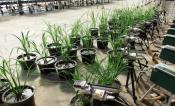
Flag leaves could help top off photosynthetic performance in rice
Illinois researchers found that some flag leaves of different varieties of rice transform light and carbon dioxide into carbohydrates better than others.
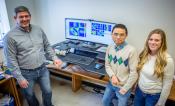
Light signal emitted during photosynthesis used to quickly screen crops
Illinois researchers reveal a new approach to estimating the photosynthetic capacity of crops to pinpoint their top-performing traits and speed up the process.
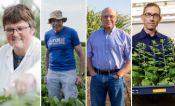
Photosynthesis researchers rank among 2020’s most influential scientists
Four RIPE researchers were among 6,167 researchers recognized by Clarivate as Highly Cited Researchers this year.
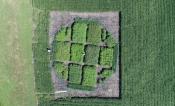
Cassava may benefit from atmospheric change more than other crops
A new study sheds light on how cassava will adapt to future levels of carbon dioxide: yields increase without diminishing nutritional quality.
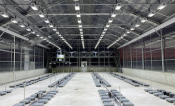
The 'Enlightened' Future of Food
RIPE has established a modern plant phenotyping facility, set in a 9,000 square foot greenhouse to research sustainable ways to increase crop yields.
By: Heliospectra
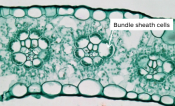
During COVID, scientists use computers to understand C4 photosynthesis when labs shut down
A team used computational approaches to understand how C4 crops express key enzymes in bundle sheath cells.
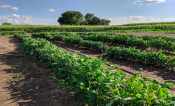
Scientists further cowpea research—boosting canopy CO2 assimilation, water-use efficiency
RIPE has analyzed how much variation exists within cowpea lines in light absorption and CO2 assimilation throughout the canopy.

Third breakthrough demonstrates photosynthetic hacks can boost yield, conserve water
RIPE has resolved two major photosynthetic bottlenecks to boost plant productivity by 27 percent in real-world field conditions.

Undergrad-led study suggests light environment modifications could maximize productivity
A new study looks into the cause of a maladaptation in C4 crops and found that altered light conditions, not leaf age, were their Achilles’ Heel.
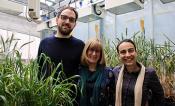
Scientists take a step closer to heat-tolerant wheat
Researchers found out how to trigger photosynthesis more efficiently at higher temperatures in wheat.

Lisa Ainsworth of USDA-ARS elected to the National Academy of Sciences
RIPE research leader Lisa Ainsworth has been elected to the National Academy of Sciences—one of the highest honors that a scientist can receive.
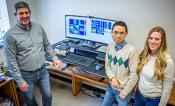
Technology to screen for higher-yielding crop traits is now more accessible to scientists
To drive progress toward higher-yielding crops, our team is revolutionizing the ability to screen research plots for key traits.
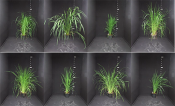
Photosynthesis varies greatly across rice cultivars—natural diversity could boost yields
Our team found a 117% difference between how rice plants harness fluctuating light to fix carbon dioxide into food, suggesting a new trait for selection.

Meet some of RIPE's wonder women
In celebration of International Women's Day, the RIPE project is shining a spotlight on some of our female scientists.
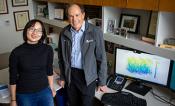
Boost soybean yields by adapting photosynthesis to fleeting shadows, according to model
Soybeans may lose 13 percent of their productivity grappling with changes in light.

Stephen Long invested as the Stanley O. Ikenberry Chair Professor of Plant Biology and Crop Sciences
Stephen Long has been invested as the Stanley O. Ikenberry Chair Professor of Plant Biology and Crop Sciences, one of the most distinguished honors at Illinois.
